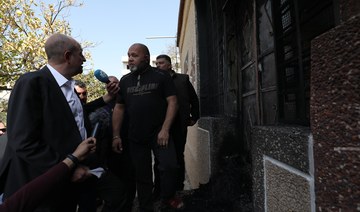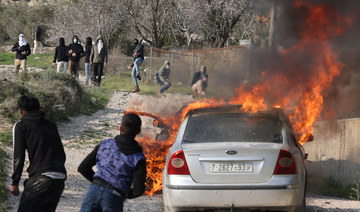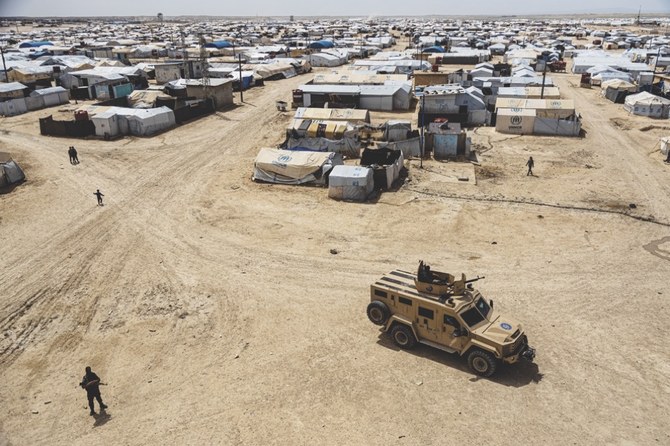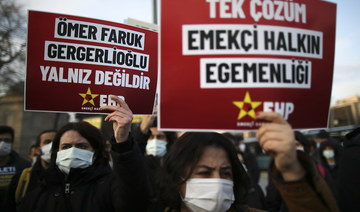RAMALLAH: Israeli police finally arrested 10 people on Wednesday in connection with a deadly rampage by settlers through a Palestinian town in the occupied West Bank.
The arrests came after three days of inaction following Monday’s incident in Hawara, when one Palestinian died as hundreds of settlers torched cars and homes, and amid unprecedented criticism by the senior Israeli military chief in the area.
Maj. Gen. Yehuda Fuchs, head of the Israeli army’s Central Command, said his forces had prepared for the possibility of a settler attack but had been surprised by the intensity of the violence.
Fuchs said the rampage was a “shameful” incident carried out by lawbreakers who “acted not according to the values I grew up with or the values of the state of Israel, and not according to the values of Judaism.”
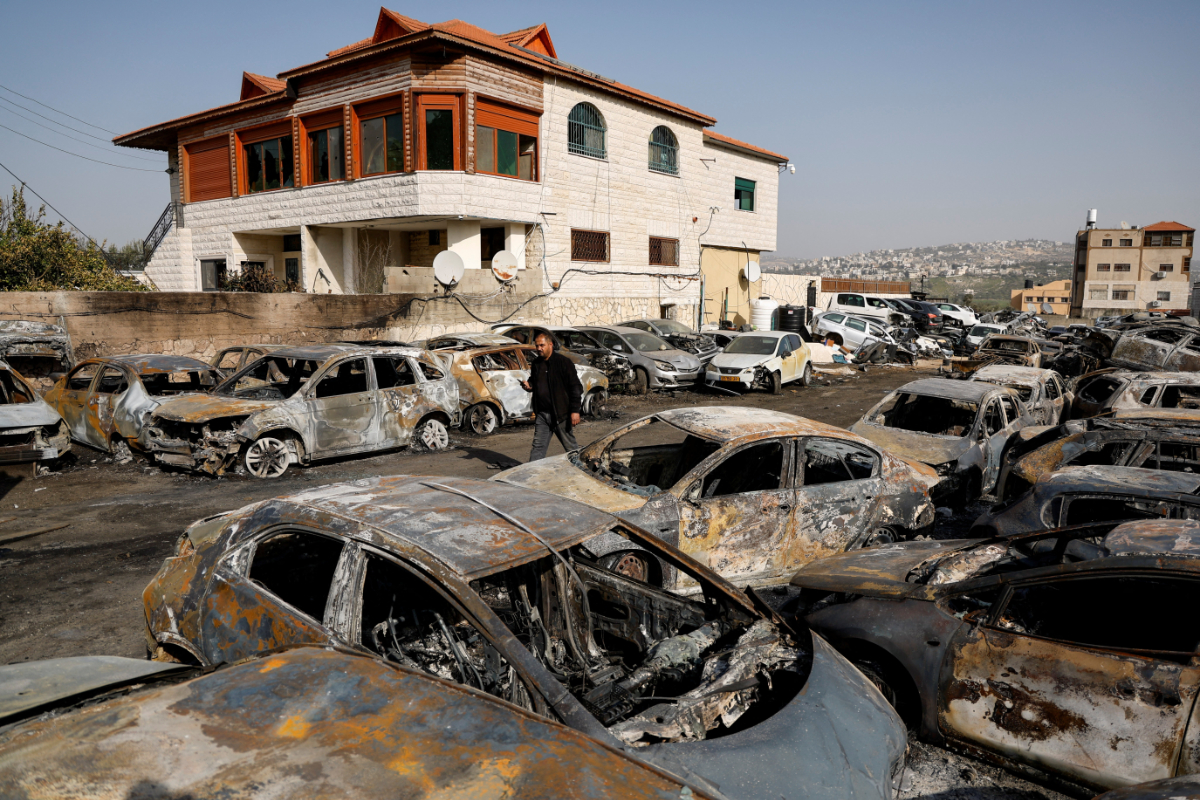
A view of cars burnt in an attack by Israeli settlers, following an incident where a Palestinian gunman killed two Israeli settlers, near Hawara in the Israeli-occupied West Bank on Feb. 27, 2023. (Reuters)
“The incident in Hawara was a pogrom carried out by outlaws,” he said. “We were not prepared for a pogrom of this magnitude, with many dozens of people.”
Pogrom is a word that describes an organized act of mass violence targeting a particular ethnic or religious group. The term had been used to refer to ethnic mob attacks against Jews in eastern Europe in the 19th and early 20th centuries.
Fuchs said: “We are currently in a period without security coordination with the Palestinian Authority. We will see what happens in the coming days.”
Shops in Hawara remained closed on Wednesday, by order of the army, amid a heavy Israeli military presence.
On a visit to the town, Palestinian Prime Minister Mohammed Shtayyeh said the arrests were not enough. “We see an organized crime perpetrated by the Israeli government and carried out by the settlers,” he said.
ALSO READ: Why West Bank violence between Israelis and Palestinians rages on despite US mediation
Hawara’s mayor, Mueen Al-Dumaidi, told Arab News that Shtayyeh had visited to take stock of the situation and assess the damage. People who lost property in the settler attacks are demanding compensation from the Palestinian Authority, including new homes. Shtayyeh has formed a committee to assess the losses and promised the government would help people to the full extent of its capabilities.
“There are 52 families whose homes were completely burned down, 40 cars were torched, in addition to the destruction of the municipality’s property, two trucks and a bulldozer,” Al-Dumaidi said.
He said the Israeli army had divided the town into five security zones and banned residents from moving between them. Troops were deployed on rooftops along the main street to prevent clashes between Palestinians and settlers.
Opinion
This section contains relevant reference points, placed in (Opinion field)
People were gripped by fear and panic, Al-Dumaidi said, and settlers had tried to attack a house on Wednesday. “Now, after the world has condemned the Israeli army’s failure to prevent settlers from attacking the Palestinians, the Israelis admit their mistake,” he said.
He described the situation in Huwara as “terrible,” saying the Israeli army has divided it into five security zones and forbidden residents from moving between them. Troops are deployed on rooftops along the main street through the town to prevent any friction or clashes between residents and settlers.
Palestinians have formed protection committees in Huwara who stay awake all night to protect homes and town property from further attacks. Al-Dumaidi said the job of committee members is to warn residents of any attack, not to engage in a fight.
Meanwhile, Palestinian and Israeli sources have expressed fears that violence will again flare in the West Bank before the start of the holy month of Ramadan, which begins in about three weeks.
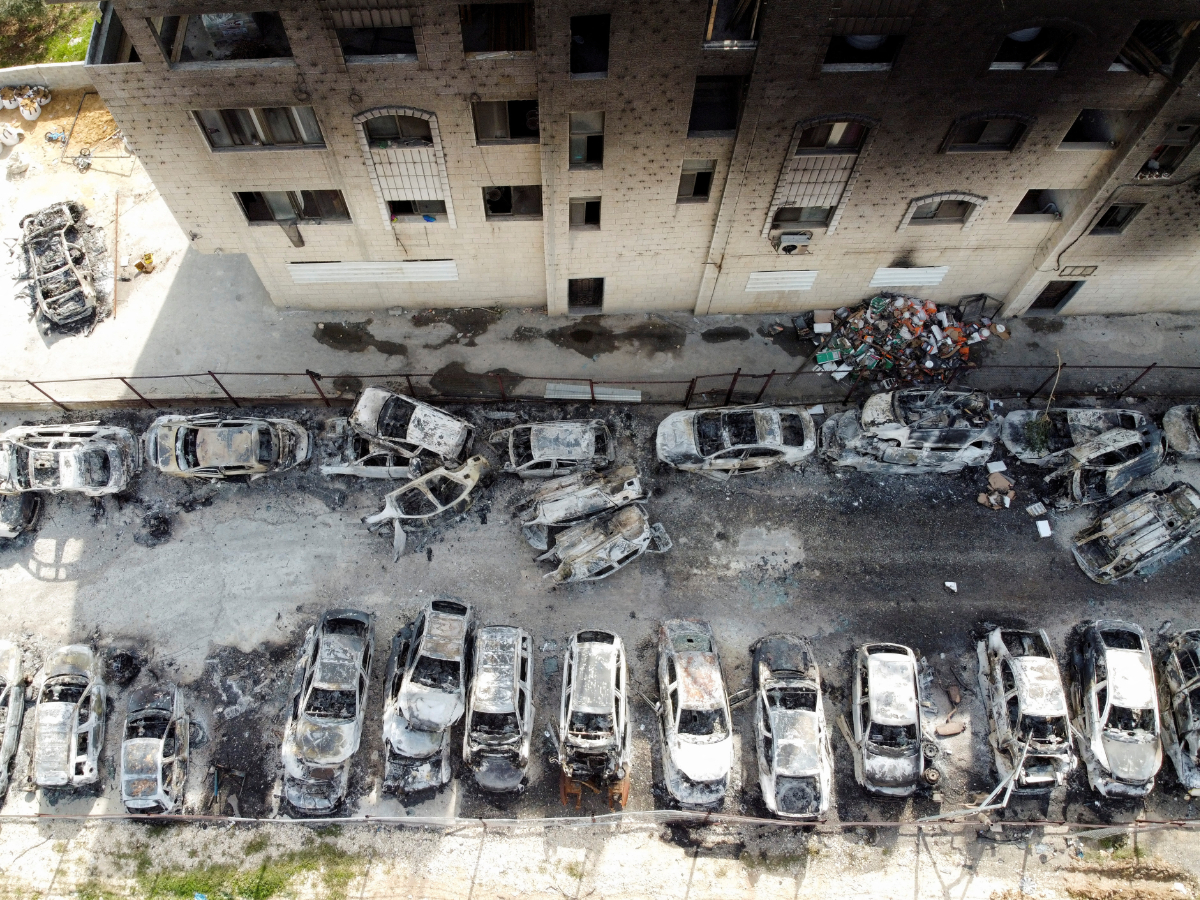
An aerial view shows a building and cars burnt in an attack by Israeli settlers near the Palestinian town of Hawara in the Israeli-occupied West Bank on Feb. 27, 2023. (REUTERS)
Amer Hamdan, a human rights activist from Nablus, told Arab News that he has noticed an apparent change in the behavior of the Israeli army toward Palestinians since the new right-wing Israeli government came to power in late December. The soldiers, he said, tolerate attacks by settlers against the Palestinians.
“If the army had the intention to act, it would move quickly and deal firmly with the settlers before they could carry out their arson attacks,” he added.
Hamdan said he has avoided traveling to Ramallah since the latest settler attacks for fear of being targeted by settlers, or soldiers at the military checkpoints that are dotted along the road.
“I do not want to be the next martyr,” he added.
In another development, Israeli forces raided the Humsa Bedouin community in Tubas Governorate in the northern Jordan Valley and demolished homes, according to Moataz Bisharat, who is in charge of the area.
Hussein Al-Shaikh, the Palestine Liberation Organization’s executive committee chief, said draft legislation on the death penalty for Palestinian prisoners found guilty of terrorism, which is passing through the Israeli Knesset, reflects an approach steeped in “racism and colonial thought.” The government-backed law passed its preliminary reading in the Israeli parliament on Wednesday.
Al-Shaikh said the party that should be tried for its crimes is the occupation, not the people suffering under the occupiers and their oppression.
Public Security Minister Itamar Ben-Gvir’s ultranationalist Jewish Power faction has promoted the death sentence bill as a means of deterring would-be Palestinian attackers after a more than year-long surge in violence that shows no signs of abating.
Critics say the death penalty is immoral, antithetical to Jewish principles, and will not serve as a deterrent.
The proposed law would allow the death penalty for a person who killed an Israeli “as an act motivated by racism or hostility toward the public” and “with the aim of harming the state of Israel and the revival of the Jewish people in its land.”
Limor Son Har-Melech, the ultranationalist settler lawmaker proposing the bill, told Kan public radio that “it is just and most moral that someone who murders Jews, and just because they’re Jews” is sentenced to death.
The bill passed by a vote of 55-9 in a preliminary reading. Most of the opposition, along with some of Netanyahu’s ultra-Orthodox allies, were not present for the vote.
(With AP)





